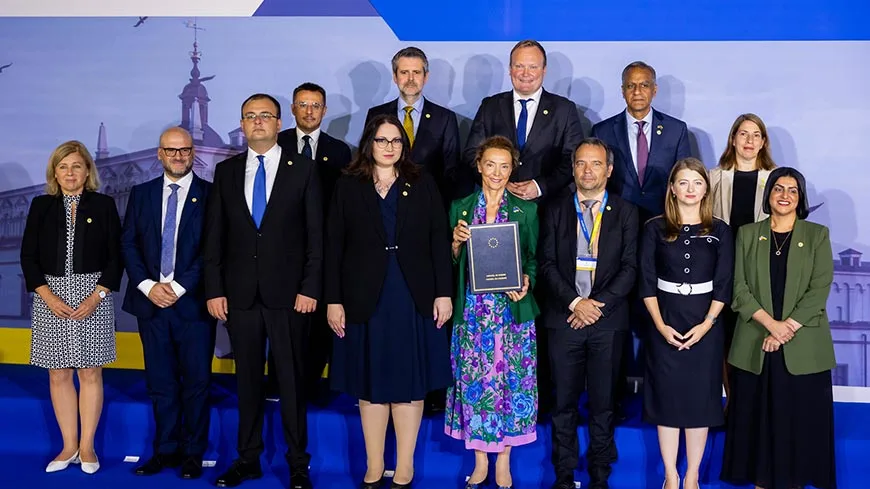In a historic move aimed at shaping the future of artificial intelligence (AI) development and governance, the United States, United Kingdom, European Union, and other leading nations (Global Powers) have signed a global AI treaty. This agreement represents a collective commitment to ensure AI technologies are developed and implemented in a safe, ethical, and beneficial manner. The treaty not only signals a new era of international cooperation but also sets the foundation for regulating AI innovations across industries.
The Importance of the Global AI Treaty
Artificial intelligence is transforming every sector, from healthcare and finance to transportation and education. While its potential to revolutionize industries is immense, AI also poses significant risks if not managed responsibly. Issues like bias in AI algorithms, data privacy concerns, and the fear of job displacement have sparked debates worldwide.
By signing this treaty, global powers are acknowledging the urgent need for AI regulation. As AI continues to advance at a rapid pace, international collaboration is critical to address the ethical dilemmas and security risks posed by these emerging technologies.

Major Nations Taking the Lead
The global AI treaty marks an unprecedented level of cooperation between some of the world’s most powerful countries. The United States and the European Union have been at the forefront of AI research and development, investing billions into AI technologies. The United Kingdom, with its thriving AI startup ecosystem, has also emerged as a key player in the global AI race. Together with countries like Canada, Japan, and Australia, these nations are driving the global agenda for AI innovation and governance.
Each of these nations recognizes the strategic importance of AI in shaping future economies and ensuring global competitiveness. By uniting under a common framework, they aim to create uniform guidelines for AI development that prioritize human safety, privacy, and fairness.
Key Provisions of the Treaty
One of the treaty’s core goals is to establish international standards for AI development and deployment. These standards include promoting transparency in AI systems, ensuring data protection, and preventing the misuse of AI technologies in harmful ways, such as mass surveillance or autonomous weapons.
The treaty also addresses the need for ethical AI, emphasizing the importance of fairness in AI decision-making processes. This includes preventing AI systems from perpetuating biases, whether related to race, gender, or socioeconomic status. By fostering ethical AI, the treaty seeks to create systems that can make decisions that are free from prejudice and discrimination.
Another significant aspect of the treaty is its focus on data privacy. As AI systems rely on vast amounts of data, safeguarding user privacy is critical. The agreement outlines measures to ensure that personal data is handled responsibly, with strict regulations on how data can be collected, stored, and used.
A Framework for Innovation and Safety
While the treaty sets clear guidelines for ethical and safe AI practices, it also encourages innovation. By providing a regulatory framework, the treaty ensures that AI can continue to evolve while minimizing risks. The goal is to foster an environment where AI can thrive, benefiting society without causing harm.
A key component of this framework is collaboration between public and private sectors. The treaty encourages governments to work closely with tech companies, research institutions, and other stakeholders to ensure that AI technologies are developed with the public interest in mind. This collaboration is seen as essential for creating AI systems that are not only innovative but also safe and reliable.
The Role of the Private Sector
Tech giants like Google, Microsoft, and IBM have played a pivotal role in the development of AI technologies. These companies, along with smaller AI startups, are now being called upon to adhere to the guidelines established by the treaty. By doing so, they can help ensure that AI continues to benefit society without compromising security or ethics.
Several private companies have already taken steps to align with the treaty’s principles. For instance, Microsoft has implemented a comprehensive AI ethics policy, while Google has established an AI ethics board to oversee the responsible use of its technologies. These efforts highlight the importance of corporate responsibility in shaping the future of AI.
AI for the Greater Good
One of the most promising aspects of the global AI treaty is its potential to address societal challenges. AI can be harnessed to tackle pressing issues like climate change, healthcare, and education. By creating a regulatory framework that encourages the development of AI for social good, the treaty aims to maximize the positive impact of these technologies.
In healthcare, AI has already shown great promise in diagnosing diseases, predicting health trends, and personalizing treatments. Similarly, AI is being used to optimize energy consumption, reduce carbon emissions, and enhance disaster response efforts. With the guidelines set forth by the treaty, these advancements are expected to accelerate while ensuring that they are developed and deployed ethically.
Addressing Concerns and Criticisms
Despite the treaty’s ambitious goals, there are concerns about its implementation. Critics argue that the guidelines may not be sufficient to prevent the misuse of AI technologies, particularly in authoritarian regimes where AI could be used for mass surveillance or censorship. Additionally, some worry that the treaty could stifle innovation by imposing too many regulations on tech companies.
However, proponents of the treaty believe that its benefits far outweigh the risks. They argue that without international cooperation, the dangers of unregulated AI far exceed any potential downsides. The treaty’s proponents are confident that, with proper enforcement, it can create a safer and more equitable future for AI.
Looking Ahead: The Future of AI Regulation
The signing of the global AI treaty marks a significant step toward the responsible development of artificial intelligence. As AI continues to evolve, so too will the need for regulations that ensure its safe and ethical use. The treaty provides a solid foundation for this ongoing process, establishing the principles needed to guide future AI innovations.
In the coming years, more nations are expected to join the treaty, further strengthening global cooperation on AI governance. As the world moves toward an AI-driven future, international agreements like this one will be crucial in ensuring that these technologies benefit all of humanity.






